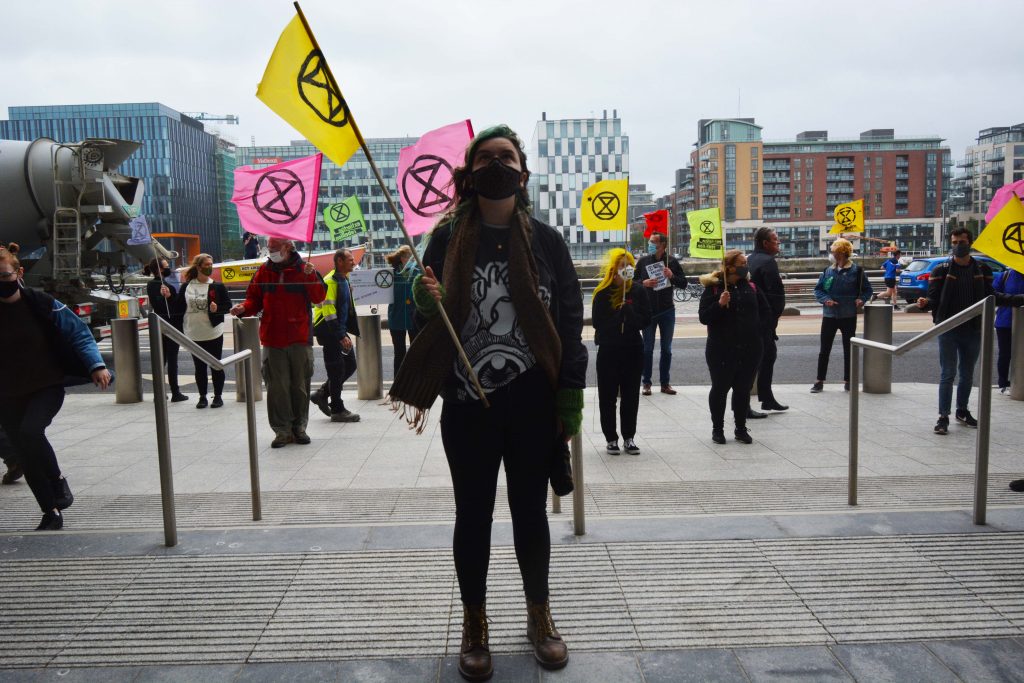Extinction Rebellion demand a “green strings attached” bailout

Climate activists have demanded that “green strings” be attached to any EU bailout funds used by the new Irish government in the wake of Covid-19.
As part of a Europe-wide action, Members of Extinction Rebellion Ireland held a socially distanced gathering in front of the Central Bank this afternoon to urge lawmakers to require “binding emissions reduction targets” for any company seeking a bailout package.
News of such bailouts could be announced in the highly anticipated multi-billion “July stimulus” package, a programme that is currently being laid out by the newly formed Irish government of Fianna Fail, Fine Gael and the Green Party.
The pre-COVID-19 business-as-usual approach prioritizes growth over human well-being, an Extinction Rebellion spokesperson said, and a transition to renewable energy and sustainable society must be, “owned by people, not corporations”.
One way of ensuring such a transition, the organisation argues, is by wedding Ireland’s economic performance to a “well-being index”, a model currently in place in New Zealand, Iceland and Scotland.
“The Covid-19 pandemic showed us how vulnerable our society is to sudden shocks. We must act now to ensure that we rebuild sustainably,” the spokesperson added.

Just Transition language “too vague”
On the heels of the new government formation, Extinction Rebellion is also calling on the Irish government to oversee an annual emissions reduction of 8 percent, one percentage point above what was outlined in the Programme for Government.
Any measures made to reduce agricultural emissions, Ireland’s largest emitting sector, must also be coupled with a concrete Just Transition, according to Extinction Rebellion member Georgia Stynes.
“We want the government to help retrain people and give them the means to farm sustainably, rather than just cutting funds completely and leaving them in the dirt,” Ms Stynes told The Green News.
While the current Programme for Government does discuss the need for and funding of a Just Transition, the language used is “too vague” and needs more elaboration going forward, Ms Stynes added.
Reset measures for a post-COVID economy
Other environmental organisations have also called for far-reaching economic policies for a post-pandemic reset.
At the onset of lockdown, ecological economics group Feasta stressed that any attempt to stabilise the economy must prioritize those hit hardest by the impacts of COVID-19.
One way to do so, the group said, would be by introducing universal basic income to improve financial security for everyone, regardless of their employment status.
The move would also protect industries that may no longer be viable in a post-pandemic economy and would allow for more flexible long-term decision making for households.
“The measures we’re advocating would not only relieve pressure on the unemployed, workers and their families in the short-term, they would also reduce the development encroachment and loss of biodiversity that are contributing to these pandemics,” ecological economist and researcher at Feasta Caroline Whyte said at the time.
The newly formed government of Fianna Fail, Fine Gael and the Green Party is planning to introduce a pilot scheme for universal basic income within its lifetime, the results of which are set to be examined by the Low Pay Commission.
Feasta also called for a legal cap on production and import of fossil fuel to gradually phase out the industry over the next three decades.
Doing so, the group finds, would provide clear guidance to investors who will need to re-think their plans after the severe shock the economy has received.







